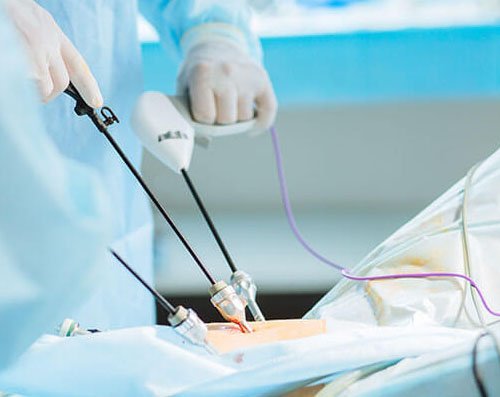
Cholecystectomy in Delhi is an operation that involves the gallbladder removal surgery in Delhi when it is damaged. Generally, the procedure is performed to prevent damage to the gallbladder and liver when gallstones appear that obstruct the ducts through which the bile flows. Cholecystectomy can be performed by open surgery or laparoscopy.
What is the gallbladder?
- The gallbladder is a pear-shaped organ that rests under the right side of the liver.
- Its main function is the collection and concentration of a digestive fluid (bile) produced by the liver. Bile is released by the gallbladder after eating, aiding digestion. Bile travels through thin tubes (bile duct) into the small intestine.
- In most patients, gallbladder removal is not associated with any digestion damage.
What are the causes of gallbladder problems?
- Gallbladder problems are usually caused by the presence of stones, which are small stones composed mainly of cholesterol and bile salts, and are formed in the gallbladder or bile duct.
- It is not known because some people form stones.
- There is no known measure to prevent stones.
- These stones can obstruct the outflow of gallbladder, causing inflammation and causing acute abdominal pain, vomiting, indigestion, and occasionally, fever.
- If the stone blocks the bile duct, jaundice (yellowing of the skin) may occur.
How are these problems found and treated?
After the patient has symptoms …
- Ultrasound (ultrasound) is the most used method to find stones.
- In a few more complex cases, other X-ray tests can be used to evaluate the gallbladder.
- The stones are not expelled by themselves. Some may be handled temporarily with drugs or with special diets, to suspend fat absorption. This treatment has a low success rate in a short time and the symptoms will continue until the gallbladder is removed.
- Surgical removal of the gallbladder is the most recognized treatment over time and safe for gallbladder pathology.
Description of The Process of Gallbladder Removal Surgery in Delhi:
In both cases, the procedure is usually performed with general anesthesia and lasts one hour.
Laparoscopic cholecystectomy in Delhi is performed with small incisions and requires a maximum hospital admission of one day.
Traditional cholecystectomy requires a larger incision to remove the gallbladder and requires patients to stay in the hospital for several days after the procedure.

BEFORE OPERATION:
The patient must undergo a prior assessment to assess his case and the specific characteristics of the intervention.
In addition, patients will have to undergo a pre-operative study that includes a blood test, an electrocardiogram, etc.
On the other hand, if you suffer from a chronic illness or if you usually take medication, especially anticoagulants, you must communicate it to the laparoscopic surgeon in Delhi before the procedure.
AFTER THE INTERVENTION:
After the procedure, patients must follow a special diet based on fluids and sweet foods for three to four weeks.
During the first days, patients may experience nausea and discomfort. It is therefore recommended to observe a moderate rest period.
Food and normal activity will gradually begin again.
Are There Risks Related to Laparoscopic Cholecystectomy?
There are risks related to any kind of operation, the vast majority of laparoscopic cholecystectomy patients experience few or no complications and quickly return to their normal activities. It is important to remember that before undergoing any type of surgery (either laparoscopic or open), you should ask your surgeon about your experience and training. The risks of laparoscopic cholecystectomy are less than the risks of leaving a condition without treatment.
Complications of Laparoscopic Cholecystectomy in Delhi are uncommon but may include bleeding, infection, pneumonia, blood clots or heart problems. An inadvertent lesion of a nearby structure such as the common bile duct or duodenum may occur and may require another procedure to repair it. Bile leaks to the abdomen from the ducts that carry bile from the liver to the duodenum have been described.
What happens after Cholecystectomy?
- Gallbladder removal surgery in Delhi is major abdominal surgery and some amount of pain can be felt. Nausea and vomiting are not uncommon.
- Once fluids or diet are tolerated, patients leave the hospital the same or the next day after laparoscopic gallbladder surgery.
- The activity depends on how the patient feels. Walking is advised. Patients can remove their bandages and bathe the day after surgery.
- Patients will probably be able to return to their normal activities within a week, including driving a car, climbing stairs, lifting light objects and working.
- In general, recovery is progressive from when the patient returns home.
- The presence of fever, yellowing of the eyes or skin, worsening of abdominal pain, bloating, nausea and persistent vomiting, or drainage from any of the wounds are indications that a complication may have occurred. You should contact your surgeon in these circumstances.
- You can request a control appointment within two weeks after surgery, even if your postoperative period has run smoothly.
